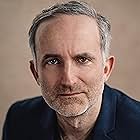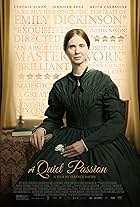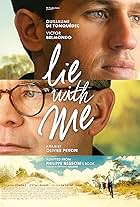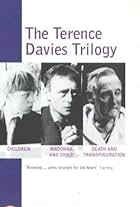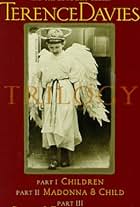ÉVALUATION IMDb
6,6/10
4,1 k
MA NOTE
L'histoire de la vie du poète, écrivain et soldat anglais Siegfried Sassoon.L'histoire de la vie du poète, écrivain et soldat anglais Siegfried Sassoon.L'histoire de la vie du poète, écrivain et soldat anglais Siegfried Sassoon.
- Prix
- 9 victoires et 22 nominations au total
Avis en vedette
Benediction.
This long film is possibly better suited for TV viewing, so for UK viewers I expect to see it on BBC TV because BBC-Films was one of the funding sources. Despite that, I'm pleased to have seen it at the almost empty cinema if only for the better focus there with no distractions of home.
I liked this more than I was expecting, which possibly says more about me than the film.
It's a surprise to me that this film got made, especially in these pandemic times, as it is quite indulgent, languid and would appeal to a possibly limited segment of cinema goers.
It is not a biography of Sassoon, as there's no mention of his father, his father's early death, the bequest from his aunt, or Heytesbury, or his death etc.
Instead it is an absorbing slightly mesmeric collage of catty dialogue, music, poetry and grainy WW1 footage and still photography artfully assembled into a tale of searching for redemption and the angst for help to deal with the past, which presumably explains the title.
The initial early transition between actors (young Siegfried and old Siegfried) could have been better handled as at least one later transition of another character was clearly done. Peter Capaldi is fabulously haunted in the role of old Siegfried, though with a clipped accent to mask the rich Scottish tones underneath. The always watchable Geraldine James appears briefly as mother.
Jeremy Irvine is devilish as Ivor Novello. Calam Lynch is acidic as young Stephen Tennant. Jack Lowden is reasonable as young Siegfried.
The first of the song choices seemed anachronistic, as the backing for grainy WW-1 footage. But this is a minor detail.
Overall: best for TV maybe, 7/10.
This long film is possibly better suited for TV viewing, so for UK viewers I expect to see it on BBC TV because BBC-Films was one of the funding sources. Despite that, I'm pleased to have seen it at the almost empty cinema if only for the better focus there with no distractions of home.
I liked this more than I was expecting, which possibly says more about me than the film.
It's a surprise to me that this film got made, especially in these pandemic times, as it is quite indulgent, languid and would appeal to a possibly limited segment of cinema goers.
It is not a biography of Sassoon, as there's no mention of his father, his father's early death, the bequest from his aunt, or Heytesbury, or his death etc.
Instead it is an absorbing slightly mesmeric collage of catty dialogue, music, poetry and grainy WW1 footage and still photography artfully assembled into a tale of searching for redemption and the angst for help to deal with the past, which presumably explains the title.
The initial early transition between actors (young Siegfried and old Siegfried) could have been better handled as at least one later transition of another character was clearly done. Peter Capaldi is fabulously haunted in the role of old Siegfried, though with a clipped accent to mask the rich Scottish tones underneath. The always watchable Geraldine James appears briefly as mother.
Jeremy Irvine is devilish as Ivor Novello. Calam Lynch is acidic as young Stephen Tennant. Jack Lowden is reasonable as young Siegfried.
The first of the song choices seemed anachronistic, as the backing for grainy WW-1 footage. But this is a minor detail.
Overall: best for TV maybe, 7/10.
A slow, stately biopic about poet Siegried Sassoon and the demons that plagued him after serving in WWI.
The movie has serious Evelyn Waugh vibes, especially "Brideshead Revisited." WWI stories always fascinate me, especially when they're about how much the war screwed up the psyches of the people who were caught up in it. This film is overall satisfying, if a bit repetitive. A huge amount of time is spent on Sassoon, a more or less openly gay man, and his various love affairs, all with caricatures of flamboyant, bitchy gay men and all of them leaving you wondering what he wanted to be around them for in the first place. Seriously, were all gay men this hateful in the 1920s? But then you think about how marginalized they were, and the answer is, well, yeah, maybe they were. They had a lot to be hateful about.
The one reason to see this movie is a big one, and that's the central performance of Jack Lowden. He's magnificent in this. Easily award worthy, though a group like the Academy Awards wouldn't recognize him in a million years.
Grade: A-
The movie has serious Evelyn Waugh vibes, especially "Brideshead Revisited." WWI stories always fascinate me, especially when they're about how much the war screwed up the psyches of the people who were caught up in it. This film is overall satisfying, if a bit repetitive. A huge amount of time is spent on Sassoon, a more or less openly gay man, and his various love affairs, all with caricatures of flamboyant, bitchy gay men and all of them leaving you wondering what he wanted to be around them for in the first place. Seriously, were all gay men this hateful in the 1920s? But then you think about how marginalized they were, and the answer is, well, yeah, maybe they were. They had a lot to be hateful about.
The one reason to see this movie is a big one, and that's the central performance of Jack Lowden. He's magnificent in this. Easily award worthy, though a group like the Academy Awards wouldn't recognize him in a million years.
Grade: A-
My initial reaction was, "unfocused and messy," but someone else called it a collage, and I think that is a more accurate description of the film.
It's not a biography, it's not really about war, or love, or living a closeted life during a specific period in UK history; it's not about aging; it's not about poetry, or trauma. The title suggests it might be about guidance, blessing, or redemption, but in regard to what, I can't really say.
It's also about all of those things, depending on the minute. The movie changes focus quite a few times, and I found that incredibly frustrating. After two and a half hours, I did not leave with any firmed-up impression of Sassoon, or the basic intention of the film.
Having said that, the lead actor and the rest are all perfectly enjoyable to watch, the dialogue is organic, and aside from spliced-in war footage, it is pleasing to the eye. It's a good choice for watching on demand or otherwise at home. But it's not a movie that lingers.
It's not a biography, it's not really about war, or love, or living a closeted life during a specific period in UK history; it's not about aging; it's not about poetry, or trauma. The title suggests it might be about guidance, blessing, or redemption, but in regard to what, I can't really say.
It's also about all of those things, depending on the minute. The movie changes focus quite a few times, and I found that incredibly frustrating. After two and a half hours, I did not leave with any firmed-up impression of Sassoon, or the basic intention of the film.
Having said that, the lead actor and the rest are all perfectly enjoyable to watch, the dialogue is organic, and aside from spliced-in war footage, it is pleasing to the eye. It's a good choice for watching on demand or otherwise at home. But it's not a movie that lingers.
Ignore the naysayers. This is a beautiful, deeply sad, elegant, and poetic film from one of the greatest filmmakers working today, Terence Davies. Many here are dismissing this film as "catty", "stereotypical", etc. It's not in the least. It's a film based on the life of Siegfried Sassoon, a real UK poet who served in WW1 with Wilfred Owen, the brilliant soldier who wrote the poetry that was the basis for Benjamin Britten's magnificent War Requiem and who was a friend/lover of Sassoon. Sasson was a poet himself, an artist, and like all artists, felt alienated throughout his life from the world he lived in. We see that art world from behind the curtain, and anyone who has ever worked, or been privvy to, the behind the scenes of the artistic world will attest this is how it is. This is the huge source of Sassoon's "alienation", not just that he's a homosexual, which many reviewers are insisting. There's a wonderful line that sums him up perfectly, and that is "most people live in the moment. You want to live in eternity". That's a beautiful, poetic summation not only of Sassoon's life, but of art in general. Davies's films often draw on art for their inspiration, and this one is no exception.
All of the performances are 1st rate, the cinematography is exquisite, the production design is breath taking, and the dialogue is some of the best I've heard in a film in a very, very long time. Thanks to Mr. Terence Davies for making such an extraordinary movie.
All of the performances are 1st rate, the cinematography is exquisite, the production design is breath taking, and the dialogue is some of the best I've heard in a film in a very, very long time. Thanks to Mr. Terence Davies for making such an extraordinary movie.
Here's a lot of old fashioned Britishness we love. Repressed emotions hidden behind immaculate manner and only expressed through biting witty comments and classy bitching. But having partially lived in and experienced modern UK (or let's just say London, that is a world of its own) for over a decade now, it's the world that's almost gone... unless for such rare moments brought back by the dying breed as Terence Davies.
In that sense, the whole film is definitely sentimental, nostalgic... and gently bitter (as oppose to bitter sweet). Even the scenes of horror from WW1 are somewhat veiled with distinctively old fashioned verses of Siegfried Sassoon. For some reason most scenes with special effects (the scene where Siegfried dropping his medal being most noteworthy) feel so dated too, as in 90's film or a student project of SiFi.
My biggest issue in enjoying the film was that I gradually lost empathy with Siegfried. He starts off as gentle, smart young man, restrained but with lucid enough self-awareness and noble idealism of a youth. Then he dips in relationships with pretty but frivolous guys, predictably gets hurt by them, and then opts for a more conventional life of marriage and child in the selfish hope that the wife and son may give him the light he craves for. And then he ends up a bitter, distant, irritable and irritating old man, who vents out to his poor wife and suffering son, practically the only people left around, for their failure to become the light he wanted them to be.
Now, it's not entirely his fault alone. The horror of the war that scarred him for life and the intolerant society that kept him from acting upon his true love have a lot to answer for. Even his shallow, egoistic post-war lovers are largely because such bold 'crazy' ones were the only people who could live somewhat openly as gay in the repressive British society.
Nevertheless Siegfried had so many privileges - his uppercrust background, artistic talent, social recognition, and few but supportive friends. Despite of it all, he makes choices against his own truth and heart, and ends up a bitter resentful old man. His last ditch attempt to God wouldn't give him the solace he craves for.
I guess that is actually the message of the film - how giving up one's true heart and truth, whether by one's own will or circumstances, can leave one just a shell of oneself. And what's the worth of a poet when he can't speak his truth?
Overall it left me somewhat unsatisfied after 2 hours of run despite of its many enjoyable and charming virtues. I suspect Terence Davies himself has never quite overcome the pessimistic view he manifested in his early trilogy.
In that sense, the whole film is definitely sentimental, nostalgic... and gently bitter (as oppose to bitter sweet). Even the scenes of horror from WW1 are somewhat veiled with distinctively old fashioned verses of Siegfried Sassoon. For some reason most scenes with special effects (the scene where Siegfried dropping his medal being most noteworthy) feel so dated too, as in 90's film or a student project of SiFi.
My biggest issue in enjoying the film was that I gradually lost empathy with Siegfried. He starts off as gentle, smart young man, restrained but with lucid enough self-awareness and noble idealism of a youth. Then he dips in relationships with pretty but frivolous guys, predictably gets hurt by them, and then opts for a more conventional life of marriage and child in the selfish hope that the wife and son may give him the light he craves for. And then he ends up a bitter, distant, irritable and irritating old man, who vents out to his poor wife and suffering son, practically the only people left around, for their failure to become the light he wanted them to be.
Now, it's not entirely his fault alone. The horror of the war that scarred him for life and the intolerant society that kept him from acting upon his true love have a lot to answer for. Even his shallow, egoistic post-war lovers are largely because such bold 'crazy' ones were the only people who could live somewhat openly as gay in the repressive British society.
Nevertheless Siegfried had so many privileges - his uppercrust background, artistic talent, social recognition, and few but supportive friends. Despite of it all, he makes choices against his own truth and heart, and ends up a bitter resentful old man. His last ditch attempt to God wouldn't give him the solace he craves for.
I guess that is actually the message of the film - how giving up one's true heart and truth, whether by one's own will or circumstances, can leave one just a shell of oneself. And what's the worth of a poet when he can't speak his truth?
Overall it left me somewhat unsatisfied after 2 hours of run despite of its many enjoyable and charming virtues. I suspect Terence Davies himself has never quite overcome the pessimistic view he manifested in his early trilogy.
Le saviez-vous
- AnecdotesSeven of Siegfried Sassoon's poems were narrated in the film: Concert Interpretation, Died of Wounds, When I'm among a Blaze of Lights, To my Mother, To my Brother, Attack, and Invocation.
- GaffesSassoon did not discard his M.C. medal as shown in this film. He tossed away the medal's corresponding ribbon. The medal itself was inherited by Sassoon's son George.
- Citations
Dr. Rivers: Why not?
Siegfried Sassoon: Too afraid, too inhibited. Shamed by an inner corruption. Or perhaps it's simply because of... What's the phrase? "The love that dare not speak its name."
Dr. Rivers: You are not alone in that respect.
Meilleurs choix
Connectez-vous pour évaluer et surveiller les recommandations personnalisées
- How long is Benediction?Propulsé par Alexa
Détails
- Date de sortie
- Pays d’origine
- Sites officiels
- Langues
- Aussi connu sous le nom de
- 베네딕션
- Lieux de tournage
- Chillington Hall, Port Lane, Brewood, Wolverhampton WV8 1RE, United Kingdom(Interiors and outdoor scenes)
- sociétés de production
- Consultez plus de crédits d'entreprise sur IMDbPro
Box-office
- Brut – États-Unis et Canada
- 201 093 $ US
- Fin de semaine d'ouverture – États-Unis et Canada
- 50 970 $ US
- 5 juin 2022
- Brut – à l'échelle mondiale
- 847 418 $ US
Contribuer à cette page
Suggérer une modification ou ajouter du contenu manquant


















